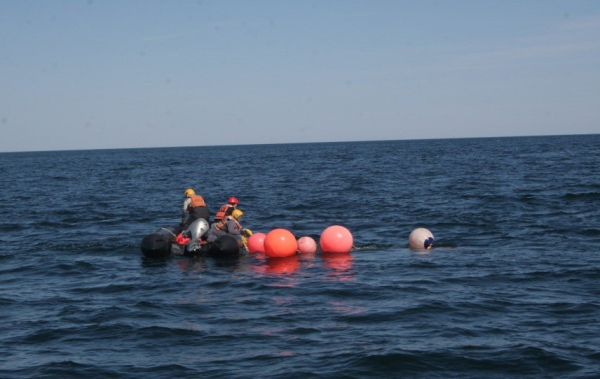Building Capacity – the Entanglement Response Network apprentices
ready to share their knowledge
The IWC Whale Entanglement Response Network has gained two valuable new trainers who will continue work to build a professional, global response capacity, focusing on the extensive coastline of Latin America.
Having previously attended an IWC training workshop and participated in a number of disentanglement operations, the apprentices undertook an advanced, three week programme over the summer. They have now returned to Latin America and have already begun leading their own training sessions.
The programme was hosted by the Center for Coastal Studies, Provincetown, who partner the IWC on this initiative. Both apprentices, Karel Beets and Ricky Rebolledo, are members of Mexico’s RABEN disentanglement team. Mexico has been heavily involved in the IWC capacity building programme since it began in 2012, and the establishment of two in-country training posts will enable a more extensive workshop programme to be delivered for the benefit of all Latin American countries.
Building on the original training workshop, the apprenticeship covered more advanced aspects of entanglement response, from boat safety regulations and design of the custom-built tools, to a study of the approaches taken by different response teams around the world. The apprentices were also able to join the CCS team on a real and very challenging entanglement response. The importance of patience and teamwork were demonstrated during the successful, 11-hour operation to free a humpback.
Whilst on the water, the apprentices took part in data collection and were trained in the use of the crossbow and dart biopsy system. This allows researchers to gather genetic information and contributes to health assessments.
Perhaps the most important aspect of the apprenticeship was learning the most effective way to deliver entanglement response training to others. David Mattila, who leads both the IWC Entanglement Response Network and the training programme, explained which topics should be covered, and provided copies of the presentations and material currently used in IWC training workshops.
Back in Mexico, the apprentices have already conducted two sessions. Thirty participants attended a 2 day workshop in Oaxaca, and a separate event was held for local fishermen, focusing on prevention.
There is much still to do in terms of both building safe and effective entanglement response capacity, and understanding how entanglements might be prevented from happening in the first place, but this apprenticeship is an important step forward and it’s hoped more will follow.
To read more about entanglement response click here.
To read more about the 11 hour humpback rescue operation click here.

